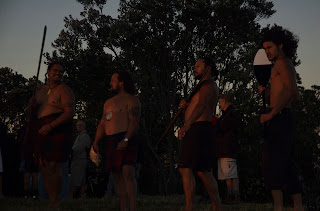Nga Mihi ki a Koutou ki Tenei Ra Ataahua o Waitangi.....
Greetings to You on This Beautiful Waitangi Day.....
We had to set off while it was still dark if we were to accomplish my annual goal of beating the sun to the top of Mauao (I'm *so* unfit):

We were blessed to be able to watch the sun as it kissed us all Ata Marie (Good Morning):






The lone bagpiper (Anthony) was almost haunting in the early morning stillness:


The "Warriors" were a spectacle unto themselves, welcoming the dawn as we all sat mesmerised:







A last look at the view over Mount Maunganui township out towards "Our Hill" before we headed down for breakfast:


On the way home we caught the boys before they got back in their Waka and paddled across the harbour for a well-earned hakari (feast!):


From www.nzhistory.net.nz:
"What is the Treaty of Waitangi?
The Treaty of Waitangi is the founding document of New Zealand. It is an agreement entered into by representatives of the Crown and of Māori iwi and hapū. It is named after the place in the Bay of Islands where the Treaty was first signed, on 6 February 1840. The Treaty was not drafted as a constitution or a statute. It was a broad statement of principles upon which the British officials and Māori chiefs made a political compact or covenant to found a nation-state and build a government in New Zealand to deal with pressing new circumstances. Like many treaties, it is an exchange of promises between the parties to it.
What does the Treaty say?
The Treaty has three articles. In the English version, these are that Māori ceded to Britain the sovereignty of New Zealand; that they gave the Crown an exclusive right to buy lands they wished to sell and in return, were guaranteed full rights of ownership of their lands, forests, fisheries and other possessions; and that they would have the rights and privileges of British subjects. The Treaty in Māori was deemed to convey the meaning of the English version, but there are important differences. Most significantly, in the Māori version the word ‘sovereignty’ was translated as ‘kawanatanga’ or ‘governance’; some Māori believed that the governor would have authority over the settlers alone; others that they gave up the government over their lands but retained the right to manage their own affairs. The English version guaranteed ‘undisturbed possession’ of all properties, but the Mäori version guaranteed ‘tino rangatiratanga’ (full authority) over ‘taonga’ (treasures, not necessarily tangible). The precise nature of the exchange within the Treaty of Waitangi is a matter of debate."
From:
A Maori Perspective
by Joseph. A. Huta
B. Theol; Post Grad Dip Tchg (Sec)
Te Pihopatanga O Aotearoa ki
Te Whare Wananga O Te Rau Kahikatea, Aotearoa-New Zealand
"In 1990 the Bishop of Aotearoa, Rt. Rev. Whakahuihui Vercoe addressed those gathered at the annual Treaty of Waitangi celebrations. That year guests included the head of the Commonwealth, Queen Elizabeth II. Bishop Vercoe made reference to the Treaty of Waitangi stating that after 150 years the Pakeha had not honoured the Treaty thus marginalizing the Maori people.
‘I want to quote from Psalm 137 – By the rivers of Babylon there we sat down there we wept when we remember Zion. Some of us have come here to celebrate, some to commemorate, some to commiserate but some come to remember what happened on this sacred ground. We come to this sacred ground because our tupuna left us this ground. A hundred and fifty years ago a compact was signed, a covenant was made between two people – to this place where a treaty was signed to give birth to a nation – a unique and unusual circumstance. Some of us have come here to remember what our tupuna said on this ground – that the treaty was a compact between two people. But since the signing of that treaty one hundred and fifty years ago I want to remind our partner that you have marginalized us, you have not honoured the treaty, we have not honoured each other in the promises that we made on this sacred ground. Since 1840 the partner that has been marginalized is me, the language of this land is yours, the custom is yours, the media by which we tell the whole world who we are is yours…
…What I came here for is to re-new the ties that made us a nation in 1840. I don’t want to debate the treaty I don’t want to re-negotiate the treaty. I want the treaty to stand firmly as the unity - the means by which we are one nation …"
…I want to conclude – as I remember the songs of our land, as I remember the history of our land I weep here on the shores of the Bay of Islands. May God give us the courage to be honest with one another, to be sincere with one another and above all to love one another in the strength of God"."

0 Comments:
Post a Comment
<< Home